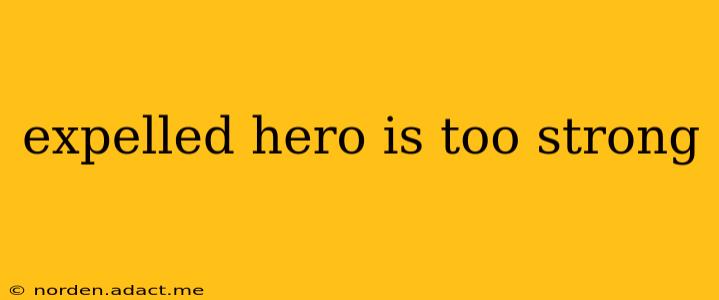Expelled Hero is Too Strong: Navigating Power Creep in Fantasy Stories
The trope of the "expelled hero," a character unjustly cast out only to become overwhelmingly powerful, is a staple of fantasy fiction. However, the very strength that makes this character compelling can also lead to narrative problems. When an expelled hero becomes too strong, it can undermine the story's tension, diminish stakes, and ultimately leave readers feeling unsatisfied. This article delves into the pitfalls of an overpowered expelled hero and explores ways to mitigate this common issue.
Why Expelled Heroes Often Become Too Strong
The inherent nature of the "expelled hero" trope often sets up a power imbalance. The protagonist, wronged and underestimated, embarks on a journey of self-discovery and revenge, often amassing power at an accelerated rate. This rapid accumulation of strength is often fueled by:
- External validation: The hero's expulsion often proves to be a catalyst, driving them to prove their worth to those who doubted them. This external validation fuels their growth, leading to a rapid increase in their capabilities.
- Lack of limitations: Early in their journey, expelled heroes are often unburdened by the constraints of established systems or mentors. This freedom allows them to explore unconventional power sources or training methods, leading to rapid advancement.
- Plot Armor: The narrative often necessitates the hero's success, inadvertently granting them immunity to consequences that would realistically hamper their progress.
These factors, while effective in establishing the hero’s initial journey, can easily lead to power creep, creating a character that’s virtually invincible.
How to Avoid an Overpowered Expelled Hero
Successfully writing an expelled hero requires careful balancing. The key is to create a powerful character without making them unbeatable. Here are some strategies to consider:
-
Internal Conflicts: Give your expelled hero significant internal flaws or weaknesses that act as limitations to their power. This could be a moral dilemma, a crippling insecurity, or even a physical vulnerability. These internal struggles can create compelling conflict, even when the hero is outwardly powerful.
-
Meaningful Opposition: Ensure the antagonists are not merely stepping stones but formidable opponents who pose a credible threat, even to a powerful hero. This could involve strategic alliances, overwhelming numbers, or unique abilities that counter the hero’s strengths.
-
Raising the Stakes: Instead of focusing solely on the hero's power, raise the stakes through the consequences of their actions. Even a powerful hero can face significant loss or irreparable damage, making their victories meaningful and hard-won.
-
Gradual Power Progression: Avoid rapid, unexplained power boosts. Instead, depict the hero's growth as a natural progression, highlighting the challenges overcome and the sacrifices made along the way. This allows for a more organic and believable portrayal of their increasing strength.
What Happens When an Expelled Hero is Too Strong?
Several negative outcomes can result from an excessively powerful expelled hero:
-
Lack of Tension: If the hero is practically invulnerable, there’s little suspense or worry for their fate, diminishing reader engagement.
-
Unrealistic Challenges: Obstacles become trivialized, reducing the impact of the hero's triumphs and making the narrative feel predictable.
-
Reduced Stakes: The consequences of failure lose their weight, impacting the narrative's emotional depth.
-
Unbalanced Power Dynamics: The power imbalance between the hero and other characters undermines the story's overall structure, potentially creating a monotonous plot.
Finding the Right Balance: A Case Study
Consider a story where a gifted mage is expelled from their academy for unorthodox methods. Instead of instantly becoming all-powerful, they could struggle with controlling their newfound abilities, facing internal conflict over their unorthodox techniques. Their opponents could be strategically clever, exploiting their weaknesses or using unconventional tactics, creating genuinely challenging conflicts that test even their considerable power.
By understanding the potential pitfalls and employing these strategies, authors can create compelling expelled heroes who are powerful but not invincible, resulting in a more engaging and satisfying narrative. The journey, not just the destination, should be the focus, ensuring that the expelled hero's growth is both believable and impactful.
